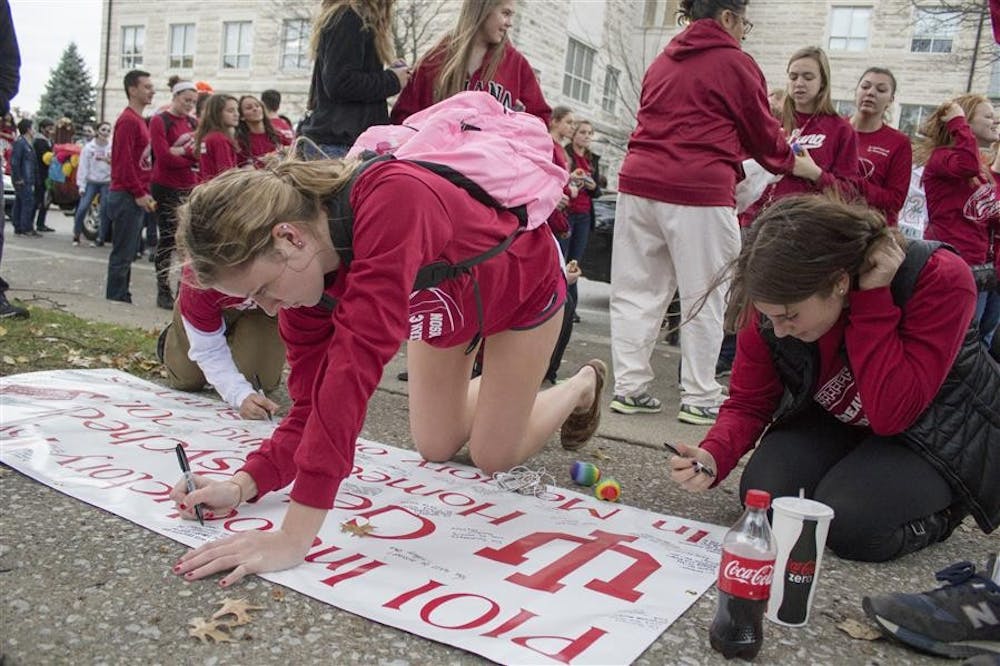Amid dozens of marching soldiers, spirited cheerleaders and a sea of cream and crimson, one group of students was quieter than the rest.
The group at the corner of Fourth and Lincoln streets gathered to pay tribute to the late psychology professor, Dr. Phillip Summers.
Summers died unexpectedly Sept. 29 of a heart attack before he could finish planning for the annual IU Homecoming parade.
Every year he encouraged his students to participate in the spirit of the occasion by joining the march.
Usually, more than 100 students complied, driven both by the incentive of extra credit and Summers’ spirit.
About 12 students signed up to work with Summers to organize the parade, but their time with him was cut short.
“He felt like people did better academically if they were more involved in the campus aspect of things,” freshman Cameron Moody said.
Summers was set to present the T-shirt designs for the parade at the committee’s fourth meeting of the year. Two days prior to the meeting, though, he died.
The parade participants all donned cream and crimson, and most of them wore student-designed T-shirts that bore a picture of a football and the text “Get Psyched! Homecoming 2013.”
In the top right corner of the T-shirts white letters spelled out “In Memory of Dr. Summers.”
As the group marched, members carried both a large white and red banner and the legacy of their favorite professor.
Several of Summers’ students were present at the parade, huddled against each other with flushed cheeks in the cool, windy fall weather.
Many of them were freshmen who had been enrolled in his Introduction to Psychology class and had only known him for about a month.
Moody, a freshman who was a part of the Homecoming committee, took on the role of organizer after Summers died.
“I think it’s important to show how awesome Dr. Summers was, and to keep his legacy going because every year he wanted to be in the Homecoming parade,” he said.
Moody is majoring in biology, he said, but Summers’ style of teaching and engaging personality pulled him into psychology so much that he is in the process of changing his major.
Summers touched the lives of other students as well.
“I came to college with the expectation that none of our professors would care about us, and he totally changed that for me,” freshman Sydney Stamatovich said. “He knew everyone’s name. It changed my perception of my freshman year, which was really neat. It’s unfortunate that he passed away.”
Stamatovich said in another one of her classes, a 15-student lecture, the professor didn’t know people’s names by the two-month mark.
She said after two weeks Summers could put names to faces easily, even with several hundred students in the lecture.
“He made you feel like an individual in a class of 300 people,” Kyle Stanley, one of Summers’ students, said. “He was really cool.”
While the group of students walked down Kirkwood chanting the slogan on their shirts aloud and passing out stress-ball sized Styrofoam brains, a woman stood to the side of the street.
Summers’ daughter was there, Moody said, but she didn’t join the march.
She just watched from the sidelines and talked to some of the students.
Others also chimed in as the students walked down the street, shouting out words of encouragement and sentiments such as, “You will be missed.”
As the parade approached the Sample Gates, where the judging tables were set up, Moody said President McRobbie showed his support by shouting out, “Go, Dr. Summers’ class!”
Even though he isn’t here anymore, Summers’ student Francisco Cardoza said the march in his memory will likely continue.
It used to be a way to carry on a tradition, but now it is a way to honor his memory, Cardoza said.
The words “caring,” “compassionate” and “awesome” were most-used to describe Summers, and smiles played on students’ lips as they remembered him.
Stanley said Summers wasn’t only recognized on IU’s campus but the man’s legacy continues all over the state.
He was also the president of Vincennes University for 21 years.
Stanley said he thought it was important to put that in perspective.
“He’s not just awesome here,” Stanley said. “He’s awesome everywhere.”
Follow reporter Anicka Slachta on Twitter @ajslachta.
Students march in memory of prof.

Get stories like this in your inbox
Subscribe



